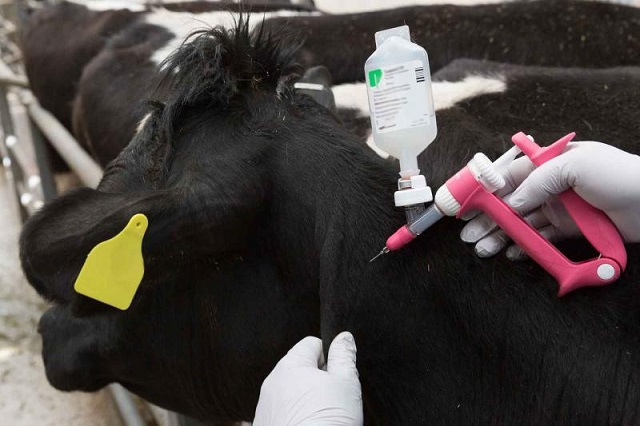
Kampala, Uganda | THE INDEPENDENT | The government has so far delivered nine hundred thousand dozes of Foot and Mouth disease (FMD) vaccines to affected areas, two months after it announced a mass vaccination exercise.
The country has been battling an FMD outbreak since December 2020, when it was first detected in districts in the southern cattle corridor.
The government also expanded cattle quarantine measures to cover more districts like Isingiro, Kiruhura, Sembabule, Kazo and Gomba as the disease spread further.
Restrictions on the movement of livestock and livestock products were also imposed on more than 20 districts including Kampala, Wakiso, which are along the transit routes.
The government targets to vaccinate at least 3 million heads of cattle by the end of the exercise, out of the total national cattle stock of 14.8 million. This is according to State Minister for Animal Husbandry Bright Rwamirama.
The total livestock number including goats, pigs and sheep is about 40 million.
Rwamirama says the exercise is not only for ensuring the supply of safe livestock products for Ugandans, but also to protect the international market.
FMD prevention is by repeated vaccinations of herds before the outbreak to create the desired immunity to protect herds from possible outbreaks.
The Ministry procured 2.3 million FMD doses to carry out strategic vaccination of animals in affected and high-risk areas, and by the end of June, all the dozes hope to have been delivered with a possibility of procuring more.
Rwamirama says the government cannot afford to vaccinate all the animals in the country at a go but says that targeted vaccinations have been successful previously, and will be the same this time.
Rwamirama is worried that the quarantines might take longer than planned because of failure by officials and farmers to respect the guidelines.
In Uganda, the disease is largely spread due to illegal animal movements within the country and across international borders for pasture, water and trade, but also activities like cattle rustling.
The ministry also cites what it calls unprofessional practices like the issuance of animal movement permits for animals from affected areas.
Rwamirama says if the local government officials, the farmers and the general public followed the quarantine guidelines, it would be easier to contain the outbreak in a shorter time.
In April, some areas in Wakiso district were also put under quarantine after cases were detected at a market in Kajjansi township, prompting quarantine in areas within a 20km radius.
The government has also warned that there are people who are posing as government officials selling vaccines to farmers, yet vaccine supply and administration is only a function of the government.
The ministry is working together with Uganda Veterinary Board to weed out people who are masquerading as veterinary doctors and paraprofessionals, who are selling to them vaccines at high costs alleged to be coming from government.
“Most times, these vaccines are counterfeits, poorly stored and sometimes administered at low dosages. Consequently, the purported ‘vaccinated’ animals come down with the disease making farmers lose money and their animals.”
Rwamirama clarified that not all farmers in a quarantined area will have their animals vaccinated. Instead, he says if a herd is considered not to be at risk, it will not be vaccinated if the exercise is going on in the neighbourhood.
He warned people especially in Isingiro who are de-campaigning the exercise to blackmail the government to lift the quarantine.
*****
URN
 The Independent Uganda: You get the Truth we Pay the Price
The Independent Uganda: You get the Truth we Pay the Price


